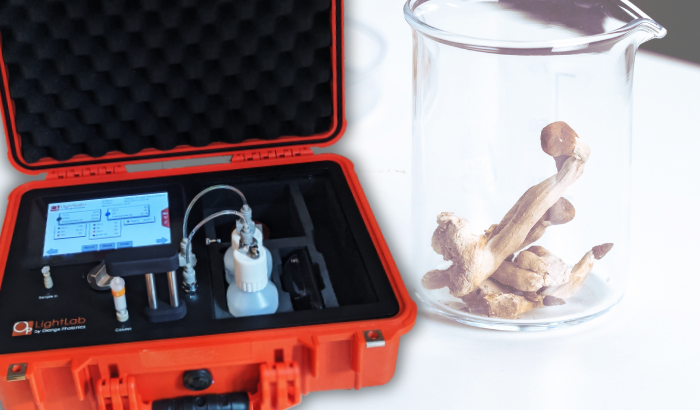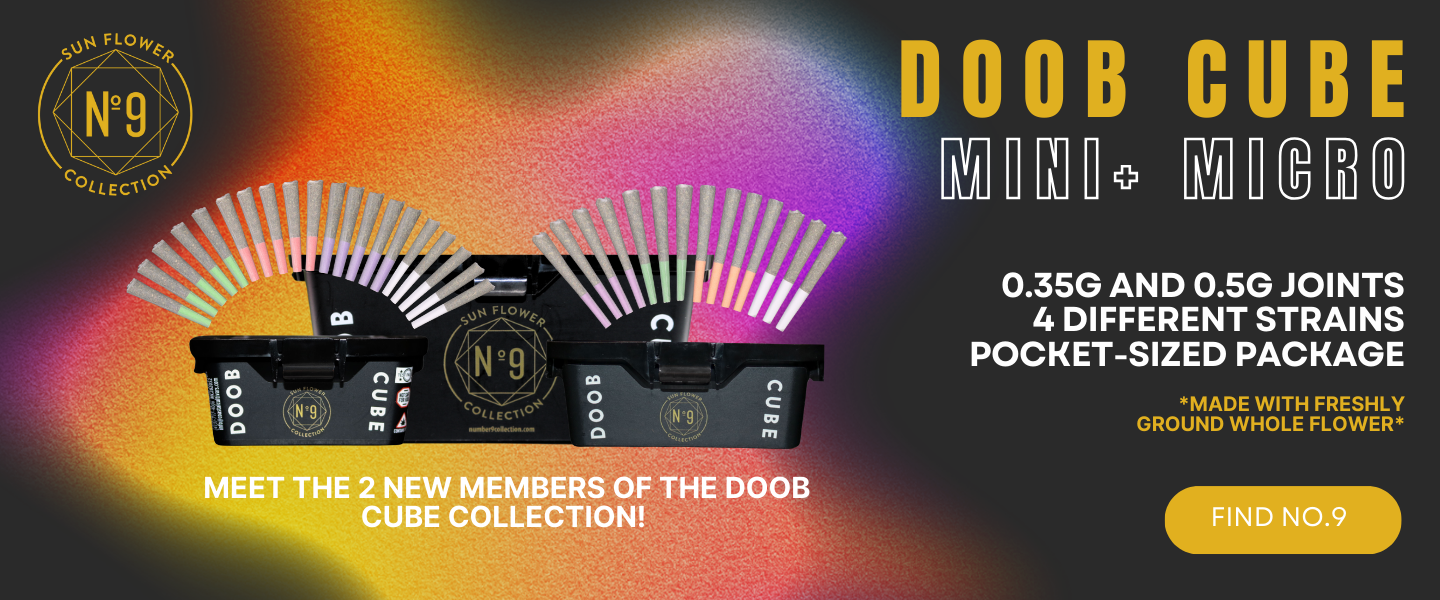
“As the industry becomes more regulated, the importance of accurate and reliable testing tools will only increase.”
This article first appeared as an exclusive in our mid-week TJM2 interview newsletter. Did you miss it? Don’t let it happen again—subscribe for all our emails for free here!
We are truly living in the future, and it was designed by psychedelic soothsayers. So much so that we recently learned the New Hampshire-based Orange Photonics has a new portable lab which “allows non-technical users to measure psilocybin, psilocin, and ACO-DMT in psychedelic mushrooms and infused products.”
Initially tooled for cannabis testing, the Granite State company’s updated LightLab 3 Psy Analyzer will “support strain selection, harvest optimization, extraction, accurate dosing, and consumer safety.” It’s a mind-expanding development, and just in time for an increase in activity across the psychedelic horizon—from the political front, to universities and research facilities, to the cultural realm.
No matter how many caps we chewed, we couldn’t wrap our heads around how this thing works. So we reached out to the company with a few questions.
We’ll get to the new Psychedelics (Psy) Analyzer in a moment, but please give us some background on your company. What’s been your flagship product or development up to this point?
Orange Photonics was founded in 2015; over the last eight years we’ve earned the position of being the cannabis industry’s go-to solution for onsite potency analysis. Our flagship product, the LightLab 3 Cannabis Analyzer, is specifically designed for individuals without a scientific background to conduct potency tests on cannabis plants and infused products. LightLab 3 measures 19+ cannabinoids in over 35 product types, from flower to gummies and baked goods. Our customers apply the real-time potency information they gather when making business decisions, informing harvest and extraction optimization through to product formulations and end product dosing.
Being New England based, is most of your business around here? Or are you all over the place?
Initially, our customer base was concentrated in early cannabis markets such as California, Oregon, and Colorado. However, today, you can find LightLabs in every state across the United States and around the world. Our customers span the entire spectrum of the cannabis industry and supply chain, including craft brands, global multi-state operators (MSOs), regulators, and universities.
How long has the company been interested in psychedelics?
We specialize in addressing narrow, unmet testing needs which is why we focused on providing the cannabis industry with an onsite potency analyzer. The psychedelics space has similar unmet needs. Based on our experience in the cannabis space, we understand that power of real-time potency data, how it can accelerate research, support quality control, and ultimately ensure consumer safety. It is clear to Orange Photonics that we are in a strong position to support safe access and industry standards.
What are some of the hurdles involved with working with psychedelics? And what problems did you enter the market looking to solve?
Orange Photonics plays a dual role in the psychedelics industry. First, the LightLab provides operators with the capability to collect real-time potency data, allowing them to consistently produce products meeting predefined specifications. Psychedelic compounds such as psilocybin and psilocin, derived from mushrooms, are sensitive and prone to degradation, which can reduce their potency when exposed to heat or improper storage conditions. The LightLab helps identify potency deficiencies in real time, enabling operators to address these issues before products reach the retail market.
Secondly, testing is fundamental for ensuring consumer safety. As the psychedelics industry evolves, regulatory bodies like the FDA or state-level commissions will eventually establish safety standards and compliance audits. Businesses that incorporate robust potency testing into their operations will have a competitive edge. Our goal is to enhance transparency, quality control, and consumer safety in this burgeoning industry, particularly in the absence of comprehensive regulations.
We frequently test packaged goods which claim to contain mushroom-derived compounds such as psilocybin and psilocin, and upon testing, confirm that the products actually contain lower quantities than the label specifies, or they contain synthesized compounds and no mushroom-based compounds at all.
How exactly does the LightLab 3 Psy work? Please tell us like you are explaining it to a 10-year-old.
LightLab is a high-performance liquid chromatograph (HPLC). HPLCs are the gold standard testing technology for cannabis and for psychedelic compounds. LightLab is different because we make complex analytical testing accessible to individuals without technical backgrounds, and it’s optimized specifically for psychedelics in this case.
First, the operator selects the sample type they are analyzing on LightLab (dry mushroom, gummy chocolate, etc.) and LightLab provides step-by-step instructions. They weigh out a sample in a test tube and then add extraction solvent. The solvent is attracted to the compounds we’re trying to measure, leaving behind the things we aren’t measuring.
The compounds we’re measuring are now floating in the extraction solvent and can be injected into the analyzer. After it’s injected, the sample is then pumped through a selective separation column. This column has an important job. It is filled with a substance which the sample molecules stick to at different strengths. Some compounds love sticking to the column, and it takes a few minutes for them to come out the other side of the column. Some compounds don’t stick to the column material at all and quickly move out of the column. That means we can see different compounds coming out of the column at different times which makes analysis of similar compounds much easier. After the column, the sample flows between a light and a detector which reads the amount of light coming through the sample. The algorithms go to work and the concentration of several psychedelics populates on the screen. The operator can generate a certificate of analysis, share the data, etc. directly from LightLab.
Can you speak a bit to the importance of this technology being portable?
LightLab’s portability maximizes how frequently the instrument can be used, delivering a rapid return on investment and avoiding testing delays. For example, the operator can bring the instrument with them when purchasing biomass to verify that the certificate of analysis matches the potency of the biomass being sold, or to confirm toll processing output or formulations are within spec. Anyone can use LightLab, meaning you don’t need to hire a technical specialist.
You mention that “LightLab 3 Psy is an essential on-site testing tool for licensed operators and research institutions.” What are some examples of operators who are licensed for this sort of research?
Universities, such as Johns Hopkins and UC Davis, and around the globe are investing in psychedelics research. In fact, the FDA issued guidance in June regarding clinical trials and drug development.
What does the future of psychedelics research look like, and what role will tools like this play in that future?
Whenever there is public demand for a good, there will be a market economy for that good whether that good is regulated or not. Given that there is a building body of evidence indicating psychedelics as potential treatments for individuals suffering from trauma, depression, and addiction in particular, we may be on a fast track toward expanded regulation, business licensure programs, and broad access through traditional health care delivery systems including Veterans Affairs.
Tools like the LightLab 3 Psy will play a crucial role in the future by ensuring that products are safe, potent, and meet quality standards. As the industry becomes more regulated, the importance of accurate and reliable testing tools like the LightLab 3 Psy will only increase, helping to protect consumers and advance scientific understanding in the field.

























